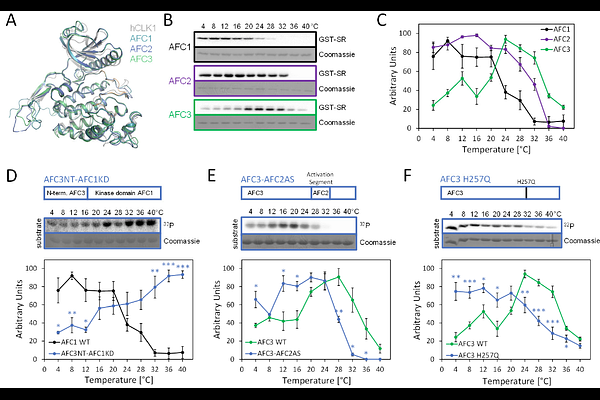AFC kinases function as thermosensors that regulate warm temperature-responsive growth in Arabidopsis

AFC kinases function as thermosensors that regulate warm temperature-responsive growth in Arabidopsis
Roehl, B.; Ostwaldt, F.; Baesmann, J.; Hausmann, P.; Kreisz, P.; Krischke, M.; Lutsch, C.; Mueller, P. C.; Strauch, M.; Weiste, C.; Zhu, T.; De Smet, I.; Heyd, F.; Maag, D.
AbstractPlants respond to elevated temperatures with enhanced elongation growth and an upward movement of their leaves. These adaptive growth responses depend on a rapid transcriptional, post-transcriptional and post-translational reprogramming. It is unclear, however, how temperature information is sensed and integrated with the cellular splicing machinery to establish warm-temperature dependent splicing patterns. In animals, CDC2-LIKE KINASES (CLKs) function as body temperature sensors that control temperature-dependent alternative splicing through the phosphorylation of serine/arginine-rich (SR) proteins. Here, we demonstrate that the CLK-homologous ARABIDOPSIS FUS3-COMPLEMENTING (AFC) kinases function as temperature sensors that regulate post-transcriptional RNA processing to control warm temperature-dependent growth responses in Arabidopsis. We show that the contrasting temperature-activity profiles of the three Arabidopsis AFCs depend on specific structural elements including a conserved activation segment within the kinase domain. By combining protein structure prediction with site-directed mutagenesis, we provide insights into structural features that determine different temperature-activity profiles of the three AFC paralogs. Subsequent analyses of afc mutant plants demonstrate their requirement for hypocotyl elongation growth and thermonastic leaf movement at elevated temperature. Impaired hypocotyl elongation of afc triple mutant seedlings was accompanied by defects in temperature-dependent splicing especially affecting the post-transcriptional regulation of transcripts encoding splicing factors. Finally, based on transcriptomics, immunodetection and mutant analyses our data indicate SR34 and SR34a as phosphorylation targets that mediate temperature-dependent post-transcriptional RNA processing downstream of AFCs. In conclusion, the characterisation of Arabidopsis AFC kinases as thermosensors provides compelling evidence that temperature-controlled AFC activity is evolutionarily conserved between plants and animals.